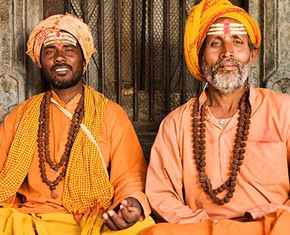The views expressed in our content reflect individual perspectives and do not represent the authoritative views of the Baha'i Faith.
We all know the scene in Monty Python’s Life of Brian, where Brian tries to escape two groups of people—the Roman soldiers, who chase him, and the adoring crowd.
 The crowd of followers, who had just listened to his “prophetic” speech, now follow him because they think he is the Messiah. Brian loses one of his sandals during his flight. The excited followers stop; one man grabs the sandal and exclaims: “Oh! … He has given us … His shoe! … The shoe is his sign. Let us follow His example.”
The crowd of followers, who had just listened to his “prophetic” speech, now follow him because they think he is the Messiah. Brian loses one of his sandals during his flight. The excited followers stop; one man grabs the sandal and exclaims: “Oh! … He has given us … His shoe! … The shoe is his sign. Let us follow His example.”
Life of Brian, probably one of the most intelligent critiques of the human failings of believers in the Judeo-Christian sphere of the Roman Empire, certainly has implications for other religions as well. In a subtle way, Monty Python makes fun of the human tendency to get caught up in trivial things and lose sight of substance.
The sandal scene in Life of Brian reminds me of a famous episode in late Ottoman history when the Ottoman state and its Muslim inhabitants had an “unforgettable” moment in their history at the discovery of a sandal of the prophet Muhammad.
At that time Sultan Abdulaziz (1861-1876) ruled the Ottoman Empire. He had unjustly exiled Baha’u’llah, his family and some followers several times. Despite several appeals the sultan and his ministers did not heed Baha’u’llah’s advice for the welfare of the people in the empire. Baha’u’llah subsequently compared them with “children gathered about and disporting themselves with clay” and found “no one sufficiently mature to acquire from Us the truths which God hath taught Us.” – The Summons of the Lord of Hosts, p. 201.
Their immaturity displayed itself, for example, in the ridiculous uproar they raised about a sandal that supposedly belonged to Muhammad. On 2 May 1872, an Ottoman newspaper (and later others) reported that the sandal was in the hands of a certain Dervish Bey in the city of Diyarbakir in southeast Anatolia. At the order of the Imperial Treasury, Dervish proceeded with the sandal and crossed Anatolia to the city of Samsun in the north by the Black Sea. During the following weeks newspapers described all the details concerning this “important” event, including miracles and “signs” surrounding the holy sandal.
Several miracles were said to have occurred along the way. When, for example, the carriage carrying the sandal crossed a bridge over a river, the normally strong current stopped and the water stood still. Another miracle supposedly occurred while the mule that carried the sacred trust to Samsun passed a herd of sheep, and the sheep suddenly surrounded the mule and started to bleat sorrowfully. When the sandal reached Samsun, it was received with the utmost honors and respect according to time-honored Muslim practice. There a little boy who had been paralyzed since birth was made to kiss and rub his face on the cloth on which the sandal was displayed at a mosque. In doing so, he was reportedly healed and could now walk.
After large crowds of people had paid their respect to the sandal in Samsun, the governor of that city carried it to the ship that was sent specially from Istanbul. This ship was assigned to carry the sacred trust and Dervish Bey to Istanbul. After arriving in Istanbul the state declared a holiday, and the grand vizier, ministers, religious scholars (ulama), sheikhs, officers and other dignitaries went to the landing place.
The grand vizier solemnly carried the box that contained the sandal and put it on a special carriage driven by four horses. Many men carrying torches attended the carriage and special guards escorted it, all praying and shouting: Allahu Akbar! (“God is the most great!”) Before and behind the carriage rode the grand vizier, preachers, scholars, sheikhs, and Dervish Bey, all mounted on a horse. The sacred sandal was brought to the Topkapi Palace, the ancient seat of the empire. It was placed in a hall for sacred relics, and ministers, ulama, sheikhs and other officials entered the hall for the blessing. The sultan visited the holy sandal following the Friday Prayers, after which it was displayed to the public for three days. Later Dervish Bey was decorated by the state and received an allowance.
The event belonged to the realm of popular Islam, where traditions were blindly followed. The state regulated and indoctrinated the Muslims in the empire with all kinds of provisions that were shown as being at the core of Islam—but in reality consisted of superstitions. Despite the fact that most of the statesmen at that time were Western-oriented and not fanatical Muslims, they deemed it wise to leave the Muslim population to their ignorance and fanaticism. In order to control the masses the state made use of events that fueled the superstitions of the people. One of these events was the discovery of the blessed sandal of Muhammad.
Baha’u’llah, at that time a prisoner in Akka, closely followed the developments in the Ottoman Empire. In one of his tablets, he refers to the shoe of Muhammad and the sensation surrounding it. After recounting the event in his own words, and criticizing all the pomp and the superficiality as secondary, Baha’u’llah turned to the main issue:
The recent news is that, in these days, it was mentioned that the Chief of the Great City (Istanbul) has heard that a person from among the grandees of Diyarbakir is in the possession of a shoe of the Apostle (Muhammad), may the souls of everyone else be a sacrifice unto Him. Thereupon the state ordered that it be brought. The aforementioned person arrived with the shoe at the coast of the Black Sea, and several ships were sent from Istanbul especially in order to carry the trust. And upon the arrival at the Great City numerous boats were also sent, and the person carrying the trust boarded the sultan’s boat and they proceeded to the City. Upon arriving at the shore the grand vizier, all the officials and the ministers advanced to meet them with anticipation. After the arrival the grand vizier came near and took the trust and entered an exquisite carriage. The carrier of the trust was mounted on an excellent horse behind the carriage. Behind him all the ministers and the officials proceeded to the place that had been designated. To the left and right of the carriage a crowd of ulama walked with jugs of incense praising and magnifying God until they arrived at the assigned place. After arriving the Chief and other people visited that place for three days in large crowds.
Here, now, is a thing on which to reflect and of which to be heedful! Observe how these people hold firm to trivial matters, and are deprived of the principle. This hath ever been the case and will continue to be so… – from a Tablet of Baha’u’llah, provisional translation by the author.
As in any other religion, the Baha’i teachings advise us to focus on the substance and not to pursue that which is absurd and senseless. In Baha’u’llah’s estimation:
People for the most part delight in superstitions. … By holding fast unto names they deprive themselves of the inner reality and by clinging to vain imaginings they are kept back from the Dayspring of heavenly signs. – Tablets of Baha’u’llah, p. 58.
Baha’u’llah exhorted the believers of all religions today to focus on the substance of faith, not its trivial details. We should not be trapped in the triviality of this life and blindly follow the superstitions inherited from our ancestors—instead, he said, we should follow the “heavenly signs.” At the end of the last passage of the tablet above, Baha’u’llah called on the people to turn their attention to the plight of the Baha’is who were unjustly exiled in the Ottoman domains: “none in these days hath given serious consideration to those divine captives (Baha’is).” – Ibid.
Like the fictional followers in Life of Brian, the Ottomans had lost track of the “substance”—the divine call of Baha’u’llah—and followed the sandal of their vain imaginings.
















Comments
Sign in or create an account
Continue with Googleor